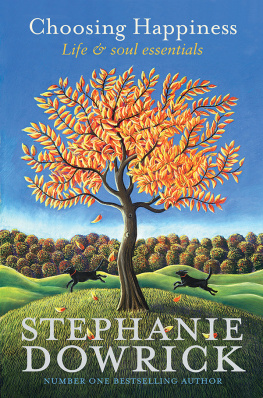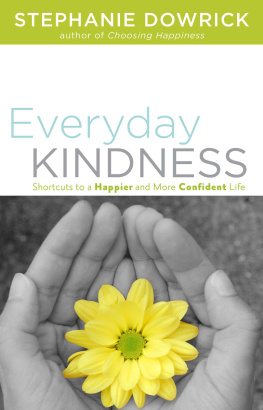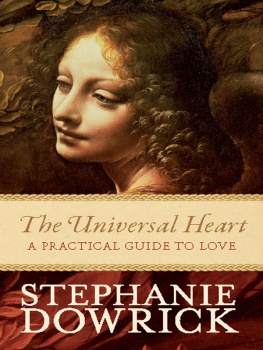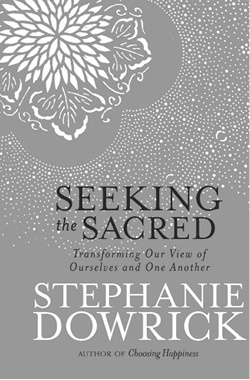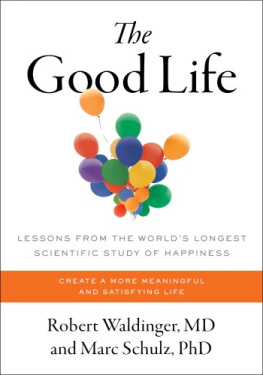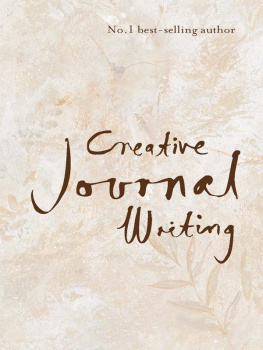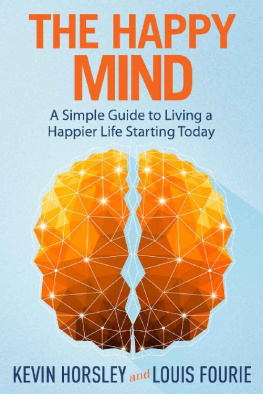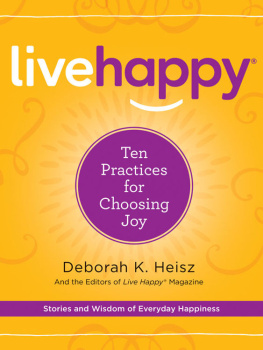Acknowledgements
Stephanie Dowrick
The insights, enthusiasm and support of a number of people have enhanced this book. I would particularly like to acknowledge Caroline Ward, Luther Poier, Wendy Weiser, Greg Andrews, Amara Sherson, and most especially Kezia Dowrick, Gabriel Dowrick and Aokie Thonsaeng, as well as Jane Moore and Geraldine Killalea for loving and sustained support. Geraldine, Jane, Greg and Luther offered close, sensitive readings of an early draft and made invaluable suggestions for which I am most grateful.
This is in many ways a culminating psychological book for me. So I want to thank those people who have inspired me in the many workshops that I have led; the clients who shared their inner worlds over many years; as well as the readers, editors and publishers who have given me priceless feedback during my writing career. I want to thank, too, those who have guided me as spiritual teachers, as well as the Australian Quaker community for two decades, my Brahma Kumaris friends, especially Charlie Hogg, and, most recently, my deans and classmates at the interfaith New Seminary, New York. In this context, I again want to thank Jane Moore for a decade of inspirational conversation and shared prayer.
Many thanks to all at Allen & Unwin, led by the talented and unfailingly kind Sue Hines, and with particular thanks to Clare Emery, Andrea McNamara, Karen Williams, Lou Johnson and Nada Backovic, and, not least, those exceptional directors, Paul Donovan and Patrick Gallagher.
Finally, I want to thank Catherine Greer, whose good humour, faith, enthusiasm and unwavering dedication contributed so much to this project from first to last.
Catherine Greer
I would like to thank Stephanie Dowrick for giving me the opportunity to discuss, read, and learn from this book as she wrote it a rare and generous gift. For their friendship, encouragement and support I gratefully acknowledge Janet Anderson and Merrin Masterman, who read early drafts of the manuscript, and Jean Bradshaw, Dorothy Hawes and Nicky Simmonds. Heartfelt thanks go to my mother, Katie Greer, who spent several months in Australia caring for our family; to my sons, Luke and Elijah, for their patience and presence; and, above all, to my husband, Luther Poier. Thank you.
CHAPTER ONE
Trust who you are
Trust yourself as a source of happiness
Everything you need
Every day is a new day
Your life is your message
What you pay attention to grows stronger in your life
Where to start
How do you see yourself?
What will you find?
No one knows you better than you know yourself
What you gain by understanding yourself better
The self I am and the self you see
Look for patterns
Challenge a familiar pattern
The power of presence
You are responsible for your own happiness
When things go wrong (and they will)
The choice is yours
Mistakes and opportunities
All your experiences can turn to gold
How to reflect
The common denominator
The big picture
Your effect on other people
You are not the centre of the universe
The world beyond ourselves
Trustworthy for others also
Know whats right about yourself
Talking to and about yourself
Maybe he wont call
Loneliness
Loneliness: the way out
A stranger to yourself
How to soothe yourself
Calm the inner chatter
The ultimate gift
Looking for love
Afraid of self-love
The problem with self-love is
Love your body (silence your complaints)
You are not a robot
Being, not doing
Body, instincts and expectations
Trust your intuition
Use friendship as your guide
Closer than you know
TRUST YOURSELF AS A SOURCE OF HAPPINESS
You have the power to choose your own happiness. People, situations, events outside yourself will affect you. But no one can give you happiness.
You may try to find all kinds of things outside yourself that will reassure you that you are happy or keep unhappiness at bay. But even the most substantial of them will be short-lived.
Romantic love, family, work success, friends, interests, status and wealth can certainly affect your wellbeing. They may, for many years, save you from the need to look harder or further. Yet sometimes even in the midst of everything, you may have a feeling that something is missing.
A happy person can have everything that the world regards as important. But someone can also have all those things, and not be happy. What makes the difference?
Inner trust makes the difference, I believe, not trust only in what the world can see, but in who you most fundamentally are: a being of intrinsic value, with everything else adding on.
This not only makes it possible to experience happiness; it also makes it possible to go on believing in happiness (connection, contentment, optimism, peace of mind) during the times it is out of reach or even out of sight.
EVERYTHING YOU NEED
You already have the strengths and qualities that you need.
Yet, if your life is anything like mine, there will be times when you overlook or forget this, when your strengths seem obscured by self-doubt, anxieties, fears, disappointments or losses. But those strengths remain. While you are living, where else could they go?
Think about them like the sky that never ceases to be blue, even when there are clouds covering it; or like the mountain that is still present, even when dense fog keeps it hidden.
Trusting yourself, and looking at your life from a more engaged and compassionate perspective, you will become more and more familiar with how to meet the world, and what it asks of you, using those strengths.
You will experience how this settles and stabilises you from the inside out.
You will experience how this quite naturally brings peace of mind, clearer choices and greater happiness. And how it changes the way you view other people and see the physical and social worlds around you.
This book speaks directly to your strengths and qualities. It invokes and develops them. It helps them and you to come fully alive.
EVERY DAY IS A NEW DAY
I have found it almost absurdly helpful to recognise that whatever stage of life I am at, I have never been here before.
There are many things that I have learned in the decades that I have lived so far, and some of them I can now put to excellent use. But if I am tempted to give myself a hard time because I dont think I am dealing with a situation as well as I should, it is extremely encouraging to remind myself that this is a brand new moment in my constantly unfolding life. And, in fact, recognising it as a new moment is the best possible way to save myself from offering a stale or habitual response.
It is also very useful to know that for most people women and men alike the decade of the twenties is spent looking outwards primarily. This is the decade when you are establishing your sense of yourself in the world, finding out what really matters to you (and what doesnt), and how other people perceive and affect you.
However, even as that decade proceeds, and certainly in the decades that follow, it is invaluable to know that other peoples reactions, values and experiences are only ever part of the picture. You also have a core sense of self that you can develop and rely upon.
It is the development of this inner sense of self that makes you much less vulnerable to feeling controlled or pushed around by other people. It makes you less dogmatic and controlling; it eventually makes you less needy of status and other peoples admiration, or less inclined to opt out as a gesture of despair. It lets you assert yourself appropriately and, more often than not, make decisions that genuinely reflect your own principles and values and what you stand for. It is also this inner sense of self that wakes you up to notice and value everyone around you and to see how deeply and inevitably your own happiness is linked to the happiness of other people.

